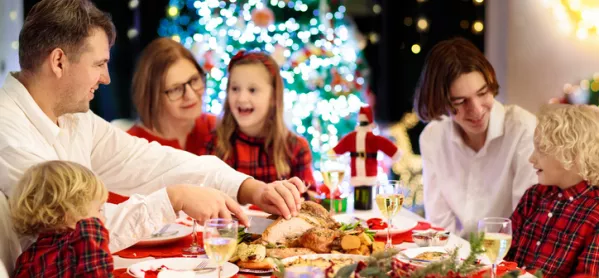Deep breaths, colleagues. Like weddings, funerals and landmark birthdays, Christmas is open season for encountering relatives who have known you since you were knee-high yet don’t have the foggiest about the you you are today. I’m on about the ones who are familiar with outdated headlines of your life, and fill in the blanks with information on you that they absorbed a lifetime ago. We’ve all got ‘em.
Who are you in their eyes? Maybe you’re the one that hates monkeys (no, a monkey reached through the zoo cage and nicked my dad’s glasses when I was a toddler). Maybe you’re the one who is a semi-professional pianist (no, I banged out Little Donkey at my nan’s house, back in the ‘70s). Maybe you’re the one who has a debilitating phobia of carrots (no, I declined a second helping that one Christmas).
While it’s face-punchingly irritating to be defined in such a way, I know I do exactly the same thing. I’m just as bad for creating a narrative around people, who I’m related to or otherwise, based solely on scant information that is long past its sell-by date. But when the subject finally lands on “What do you do for a living nowadays, then?”, the previously rocky territory suddenly turns into a minefield.
More: How colleges show the spirit of Christmas
Opinion: Why college staff deserve our thanks this Christmas
News: What the Queen’s Speech says about further education
I’ve got lots of teacher pals who came to education after a different career and many experience the similar assumption about their job that I sometimes get. That this teaching palaver is just a bit of busy work to fill the days until that other career picks up again. Chuck FE in the mix and… welcome to the land of confusion.
The teacher’s Chistmas cribsheet
So, here’s a handy cribsheet, for those times over the holidays where you are incarcerated with distant relatives, who still think you have exactly the same talents, tastes and temperament as you had aged 7.
Uncle Gerry says you’re ‘having a go at being a university lecturer’ now
DO SAY
“I’m a lecturer at a college, not a university. Colleges are mostly for students over the age of 16, but they also teach adults, too. Students can learn a trade or an academic subject or a profession. Loads of jobs are a combination of all those things.”
DON’T SAY
Yes, that’s right. I did a 10-minute quiz and I am having a go at being a lecturer. I work at the University of Oxbridge. I might have a go at being a carpet-fitter next or a storm chaser. Whichever has the shortest quiz.”
‘Aren’t colleges aren’t for the thick kids?’
DO SAY
“I think people learn in different ways at different times in their lives and have a range of skills and talents. Colleges support people towards the kind of life and work they aspire to.”
DON’T SAY
“Look who’s talking - Auntie ‘Fails All Her O levels Except Art, But Thinks She’s Tracey Emin’ Janice.”
‘Stay strong, it won’t be much longer ’til you can go back to (insert previous profession).’
DO SAY
“I loved being a (insert previous profession) but I chose to be a teacher, and I’m really proud of my work.”
DON’T SAY
“What’s really happening here, Lisa? Is this about Dave’s affair with your Jackie’s primary teacher? Either let it go or move on. It was 30 years ago. And Dave is, after all, dead.”
‘You must have the patience of a saint dealing with all the yobs/thugs/hoodies/ne’er-do-wells. Kids weren’t like that in my day.’
DO SAY
“Sometimes some teenagers are challenging to be around, just like some adults are, too. But lots of my students have an interesting perspective and can be fun or cheeky or curious or full of energy.”
DON’T SAY
“Yes, they are a shower of complete arseholes. But kids being arseholes is not new. You were a kid once, Grandma.”
Sarah Simons works in colleges and adult community education in the East Midlands and is the director of UKFEchat. She tweets @MrsSarahSimons




